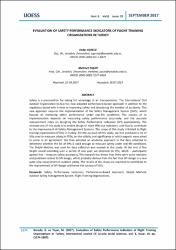Emniyet Performans Göstergelerinin Değerlendirilmesi: Türkıye’deki Uçuş Eğitim Okulları Bağlamında Bır İnceleme
Özet
Havayolu taşımacılığının sunduğu faydaların elde edilmesi havayolu taşımacılığının emniyetli bir biçimde sürdürülebilmesi ile mümkündür. Uluslararası Sivil Havacılık Örgütü emniyeti daha da artırmak ve kaza sayılarını azaltabilmek amacıyla emniyet yönetiminde dünyayı olması gerektiği gibi gören paradigmanın ürünü olan düzenleme temelli yaklaşımın yanına dünyayı olduğu gibi gören paradigmanın ürünü olan performans temelli yaklaşımı eklemiştir. Bu yaklaşım gerçek hayat şartlarında emniyet performansını artırmaya odaklanan Emniyet Yönetim Sisteminin (EYS) uygulanmasını gerektirmektedir. Bu kapsamda emniyet performansının doğru bir biçimde ölçülmesi son derece önemlidir. Doğru bir ölçüm ise Safety Performance Indicators'ların (SPIs) geçerli bir biçimde tasarlanmasına bağlıdır. Bu çalışmanın kapsamını Türkiye'deki uçuş eğitim organizasyonları -flight training organizations- (FTOs) oluşturmaktadır. Çalışmada FTO'larda emniyeti ölçmek için hangi emniyet performans göstergelerinin kullanıldığı ve çalışmaya katılan uzmanlara göre hangilerinin daha geçerli ve önemli olduğu konusunda üzerinde hemfikir olunacak SPI'ların listesi çıkartılmıştır. Sonrasında elde edilen veriler akademik bir yaklaşımla incelenerek emniyeti ölçecek geçerlilikte olup olmadıkları tespit edilmiştir. Araştırmada verilerin toplanmasında ve analiz edilmesinde Delphi tekniği kullanılmıştır. 1 yıllık zaman dilimini kapsayan 5 Delphi turu sonunda uçuş okullarında emniyeti doğru bir biçimde ölçtüğü düşünülen ve katılımcıların üzerinde hem fikir oldukları 64 SPI elde edilmiştir. Araştırma sonunda SPI tasarımında bazı hata ve sorunların olduğu tespit edilmiş ve bu durum SPI tasarımının yeni bir gereklilik olmasına bağlanmıştır. Çalışmanın SPI tasarımındaki ve dolayısıyla EYS'deki başarıyı artıracağı düşünülmektedir Safety is a precondition for taking full advantage of air transportation. The International Civil Aviation Organization (ICAO) has now adopted performance-based approach in addition to the regulatory-based with a view to improving safety and decreasing the number of accidents. This new approach requires the implementation of the Safety Management System (SMS), which focuses on increasing safety performance under real-life conditions. The success of its implementation depends on measuring safety performance accurately, and the accurate measurement relies on designing the Safety Performance Indicators (SPI) appropriately. The ultimate aim of this study is to enable design of more effective indicators, and thus to contribute to the improvement of Safety Management Systems. The scope of this study is limited to flight training organizations (FTOs) in Turkey. For the purpose of this study, we first produced a list of SPIs used to measure safety in FTOs, on the validity and significance of which experts were asked to come to an agreement. We then adopted an academic approach to the data collected to determine whether the list of SPIs is valid enough to measure safety under real-life conditions. The Delphi Method was used for data collection and analysis in this study. At the end of five Delphi round extending over a period of one year, we obtained 64 SPIs, which – participants agreed that – measure safety accurately. The research has shown that there were some mistakes and problems related to SPI design, which probably derives from the fact that SPI design is a new quite new requirement in aviation safety. The results of this study are expected to contribute to the improvement of SPI design and hence the success of SMS
Kaynak
Uluslararası Avrasya Sosyal Bilimler DergisiCilt
8Sayı
29Bağlantı
http://www.trdizin.gov.tr/publication/paper/detail/TWpZek1EWTBOQT09https://hdl.handle.net/11421/11039
Koleksiyonlar
- Makale Koleksiyonu [791]
- TR-Dizin İndeksli Yayınlar Koleksiyonu [3512]


















